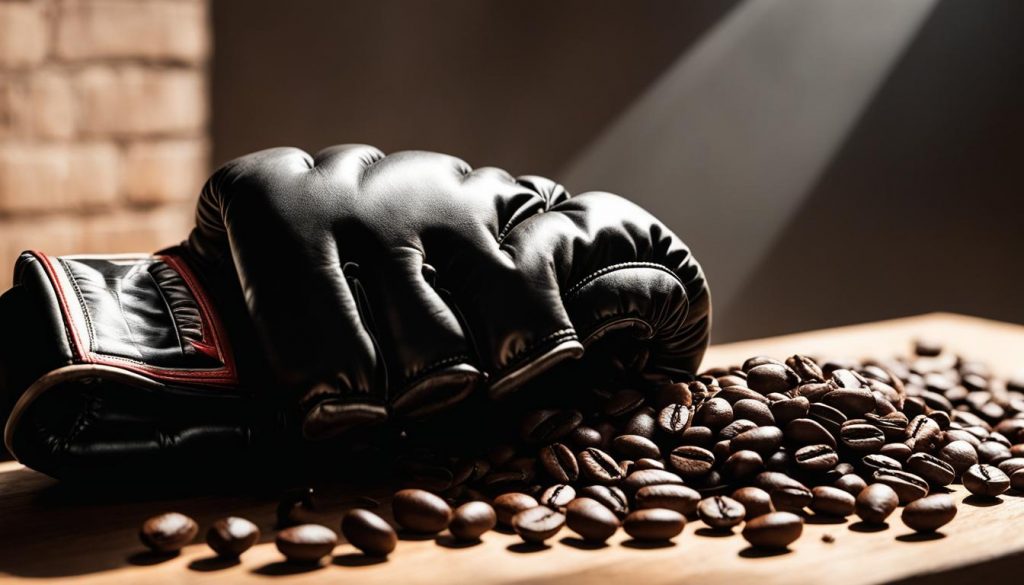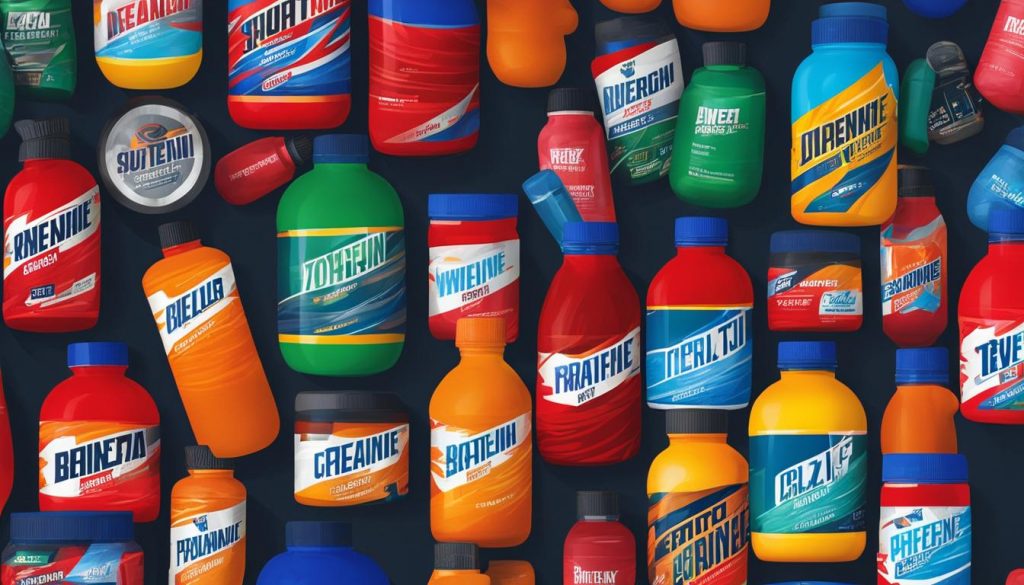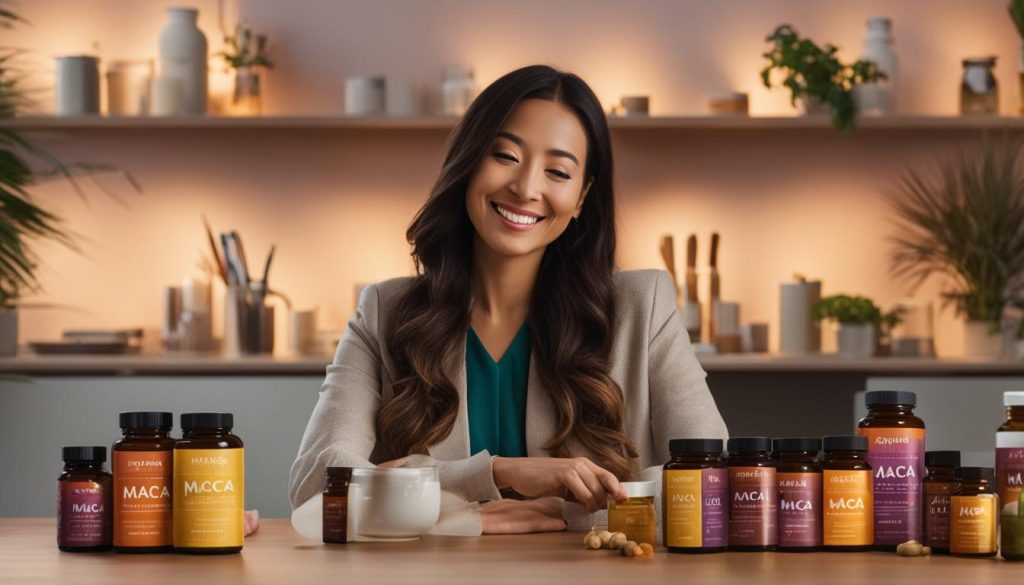Welcome to our write-up highlighting the top supplements for boxing! Regardless if you’re an experienced professional or a novice aiming to boost your time on the boxing display, integrating the appropriate supplements into your workout routine can greatly affect your performance. This article will delve into the finest boxing supplements that can elevate your nutrition, enhance your performance, and assist in your post-exercise recovery. Let’s get started!
Key Takeaways:
- Choosing the right supplements can enhance boxing performance and aid in recovery.
- Supplements such as vitamin D3, probiotics, omega-3, iron, caffeine, and creatine monohydrate have been shown to provide various benefits for boxers.
- Consult with a healthcare professional or sports nutritionist for personalized guidance on supplement usage.
- Prioritize a well-rounded diet and overall health alongside supplement usage.
- Remember, supplements should complement a comprehensive training and nutrition program.
Supplements for Health in Boxing
Taking care of your health is crucial in a physically demanding sport like boxing. In addition to a well-rounded diet, certain supplements can provide the extra support that boxers need to maintain optimal health and enhance their performance. Here are some of the best supplements for overall health in boxing:
Vitamins for Boxers
Vitamins play a vital role in maintaining overall health and supporting various bodily functions. For boxers, ensuring an adequate intake of vitamins is essential. Some key vitamins for boxers include:
- Vitamin D: Promotes bone health, immune function, and muscle recovery. (1)
- Vitamin C: Supports the immune system and aids in collagen synthesis for joint health. (2)
- Vitamin E: Acts as an antioxidant, protecting cells from damage caused by intense training. (3)
- Vitamin B complex: Provides energy and supports neurological function. (4)
Probiotics for Boxers
Gut health plays a crucial role in overall well-being and immune function. Probiotics are beneficial bacteria that promote a healthy gut microbiome. For boxers, maintaining a healthy gut is important to support their immune system, optimize nutrient absorption, and aid in digestion. Consider adding probiotics to your daily routine through supplementation or consuming probiotic-rich foods like yogurt and fermented vegetables. (5)
Omega-3 for Boxers
Omega-3 fatty acids are essential fats that offer numerous health benefits. For boxers, omega-3 supplementation can help reduce inflammation, support cardiovascular health, and aid in muscle recovery. Additionally, omega-3s have been linked to improved cognitive function, which can be beneficial for boxing athletes. Look for high-quality fish oil or algae-based supplements to ensure an adequate intake of omega-3s. (6)
Iron and Calcium for Boxers
Iron and calcium are essential minerals that play crucial roles in physical performance and overall health. Iron is required for the production of hemoglobin, which carries oxygen to the muscles. Calcium is necessary for bone health and muscle function. Boxers, especially females, may be at risk of iron deficiency due to intense training and dietary restrictions. Calcium is also important for athletes to maintain strong bones and prevent injuries. Ensure an adequate intake of iron and calcium through a balanced diet or consider supplementation if needed. (7)
By incorporating these supplements into your training regimen and maintaining a well-rounded diet, you can support your overall health as a boxer and optimize your performance in the ring.
“Supplements can provide the extra support that boxers need to maintain optimal health and enhance their performance.”
Supplements for Health in Boxing
| Supplement | Benefits |
|---|---|
| Vitamins | Promotes overall health, supports immune function, aids in muscle recovery |
| Probiotics | Improves gut health, enhances immune system, aids digestion |
| Omega-3 | Reduces inflammation, supports cardiovascular health, aids in muscle recovery, improves cognitive function |
| Iron | Supports oxygen transport, prevents iron deficiency |
| Calcium | Promotes bone health, supports muscle function |
Vitamin D3 for Boxing Performance
Vitamin D3 plays a crucial role in the performance and overall health of boxers. It is involved in maintaining strong bones, supporting immune function, and aiding in muscle recovery. Boxers, like many athletes, are at risk of vitamin D deficiency, which can have negative effects on their performance and well-being.
One of the key benefits of vitamin D3 for boxers is its impact on bone health. As a contact sport, boxing puts a significant strain on the bones, increasing the risk of fractures and injuries. Sufficient levels of vitamin D3 help in the absorption of calcium and phosphorus, essential minerals for bone strength and density.
Vitamin D3 also plays a vital role in immune function. Boxers are constantly exposed to physical stress and intense training, which can weaken the immune system. Adequate levels of vitamin D3 can support the body’s defense against infections and upper respiratory tract infections, reducing the risk of illness and missed training sessions.
Furthermore, vitamin D3 aids in muscle recovery, which is crucial for boxers to maintain peak performance. It helps in reducing inflammation and promoting muscle repair after intense training or competition. Boxers with optimal vitamin D3 levels may experience faster recovery, decreased muscle soreness, and improved muscle function.
Supplementing with vitamin D3 is especially important for boxers during the winter months when sunlight exposure, a natural source of vitamin D, is limited. A daily dosage of 4000 IU of vitamin D3 is recommended for athletes, including boxers, to maintain optimal levels.
“Sufficient levels of vitamin D are essential for boxers to support bone health, boost immunity, and aid in muscle recovery.”
It is important to note that vitamin D3 requirements may vary based on individual factors such as body weight, skin color, and sun exposure. It is recommended to have your vitamin D3 levels checked by a healthcare professional before starting supplementation to determine the appropriate dosage for your specific needs.
To summarize, vitamin D3 plays a crucial role in the performance and overall well-being of boxers. Supplementing with vitamin D3 can improve bone health, enhance immunity, and promote muscle recovery. Consult with a healthcare professional or sports nutritionist to ensure you are meeting your vitamin D3 needs for optimal boxing performance.
Probiotics for Improved Immunity in Boxing
Probiotics are a lesser-known supplement for boxers but can be highly beneficial. They enhance intestinal permeability, regulate the immune system, improve gut health, and reduce the risk of upper respiratory tract infections. During training camps, boxers often experience intensified training and increased susceptibility to illness. Taking probiotics can protect immunity and reduce the risk of training days missed.
One popular probiotic option is Yakult, a probiotic drink that contains a strain of probiotics called Lactobacillus casei Shirota. Consuming 1-2 Yakults daily can provide a sufficient dose of probiotics for gastrointestinal health and improved immunity.
Alternatively, one can opt for a probiotic supplement. Look for a supplement containing 20-50 billion cultured units of Bifidobacterium Bifidum, a strain of probiotics known for its immune-boosting benefits. Taking this supplement on a daily basis can fortify the immune system and support gastrointestinal health, which is especially important during boxing training camps.
Remember, the gut plays a significant role in overall health, including immune function. By incorporating probiotics into your diet or supplement regimen, you can maintain a healthy gut and improve your body’s ability to fight off infections.
Probiotics can be a game-changer for boxers, promoting enhanced immunity and gastrointestinal health. By incorporating probiotics into your routine, you can stay in top form throughout your training and minimize the risk of disruptions caused by illness.
Omega-3 for Boxing Performance and Brain Health
Omega-3 fatty acids are an essential component of the boxer’s diet, providing numerous benefits for both performance and brain health. These healthy fats have been shown to have anti-inflammatory properties, which can help reduce muscle soreness and promote faster recovery after intense training sessions.
But the benefits of omega-3 go beyond muscle soreness. Research suggests that omega-3 supplementation may also play a role in improving brain health and reducing the risk of concussions. Boxers are especially susceptible to head trauma, and protecting brain health is of utmost importance in this sport.
Omega-3 fatty acids, specifically eicosapentaenoic acid (EPA) and docosahexaenoic acid (DHA), have been found to support cognitive function and may have a neuroprotective effect. Omega-3 supplementation has shown promise in reducing the severity and duration of concussion symptoms following traumatic brain injury.
To ensure optimal benefits, it is important to choose a high-strength omega-3 supplement with a high ratio of EPA and DHA. These two components are most closely associated with the therapeutic effects of omega-3 fatty acids.
Consider incorporating omega-3 supplementation into your boxing routine to enhance muscle recovery, promote brain health, and reduce the risk of concussions. Consult with a healthcare professional or sports nutritionist for personalized guidance on the appropriate dosage and duration of supplementation.

Omega-3 supplementation has shown promise in reducing the severity and duration of concussion symptoms following traumatic brain injury.
Iron for Improved Performance in Boxing
Iron deficiency is prevalent in athletes, particularly among females and vegan athletes. In boxing, iron plays a crucial role in oxygen transportation and utilization, making it essential for optimal athletic performance. Boxers with iron deficiency may experience fatigue, reduced aerobic performance, and decreased strength.
Supplementing with iron can significantly improve iron status and enhance aerobic capacity in endurance athletes. It is important for boxers to have their ferritin iron levels checked regularly to monitor and address any deficiencies. In addition to iron supplementation, ensuring a proper intake of iron-rich foods is vital for maintaining iron levels.
Here is a table highlighting the benefits of iron for boxing performance:
| Benefits of Iron for Boxing |
|---|
| Improves oxygen transport and utilization |
| Enhances aerobic capacity |
| Reduces fatigue |
| Supports muscle strength |
“Iron is a vital mineral for boxers. It helps deliver oxygen to working muscles, leading to improved aerobic performance and reduced fatigue.” – Dr. Sarah Johnson, Sports Nutritionist
By addressing iron deficiency through supplementation and a well-balanced diet, boxers can optimize their performance and prevent the negative effects of iron deficiency on their athletic abilities.
Caffeine for Enhanced Boxing Performance
Caffeine is a widely used performance supplement that can benefit boxers in multiple ways.
Firstly, caffeine can reduce fatigue, allowing boxers to train harder and for longer periods of time. By stimulating the central nervous system, caffeine can help combat feelings of tiredness and increase alertness during workouts.
In addition, caffeine has been shown to improve reaction time. Quick reflexes and rapid decision-making are crucial in the fast-paced environment of boxing. By consuming caffeine before a training session or competition, boxers may experience enhanced cognitive function, enabling them to react more swiftly to their opponent’s movements.
Furthermore, caffeine has thermogenic properties that can contribute to fat burning. It stimulates the release of stored fats into the bloodstream, making them available as a source of energy. This can be particularly beneficial for boxers looking to maintain or achieve a desirable weight for their weight class.
| Benefits of Caffeine | |
|---|---|
| Reduces fatigue | Increases reaction time |
| Enhances pain perception | Increases fat burning |
When incorporating caffeine into your boxing training regimen, it is important to choose a form that suits your preferences. Caffeine can be consumed in various forms, such as tablets, coffee, gum, or shots. Experiment with different options to find what works best for you.
The recommended dosage of caffeine before exercise is 3-6mg/kg of body weight. However, it is essential to note that caffeine should be avoided in the late afternoon or evening to prevent sleep disturbances.
Remember to consult with a healthcare professional or sports nutritionist before adding caffeine or any other supplement to your routine to ensure it aligns with your individual needs and health considerations.

Creatine Monohydrate for Enhanced Boxing Performance
Creatine monohydrate is a well-researched supplement that offers numerous benefits for boxers. It is widely recognized for its ability to improve short-duration high-intensity exercise, making it particularly advantageous during boxing training sessions and fights. By increasing the body’s creatine phosphate stores, creatine monohydrate enhances ATP production, the energy currency of our cells, leading to enhanced muscle energy and performance.
One of the key benefits of creatine monohydrate is its ability to increase lean muscle mass. By promoting muscle protein synthesis and reducing muscle breakdown, it supports the development of more defined and powerful muscles, ultimately improving overall strength and explosiveness in boxing. This increased muscle mass is especially valuable for boxers who rely on explosive movements and quick bursts of power in the ring.
Beyond its impact on physical performance, creatine monohydrate also offers potential benefits for brain health. The brain utilizes phosphocreatine, a form of creatine found in high concentrations, as an energy source. By supplementing with creatine monohydrate, boxers can increase brain phosphocreatine levels, potentially enhancing cognitive function, focus, and reaction times.
Vegan and vegetarian boxers may particularly benefit from creatine monohydrate supplementation. Plant-based diets tend to have lower levels of creatine, as it is primarily found in animal products. By supplementing with creatine monohydrate, vegan and vegetarian athletes can ensure their creatine levels are optimized, which can lead to improved muscle strength and power.
The recommended daily dosage of creatine monohydrate for long-term supplementation is 5 grams. It is important to note that it might be beneficial to start with a loading phase of 20 grams per day for the first week to quickly saturate the muscles’ creatine stores. This can be followed by a maintenance phase of 5 grams per day to maintain optimal creatine levels.
Summary of Benefits:
- Improves short-duration high-intensity exercise
- Increases lean muscle mass
- Enhances muscular strength
- Promotes brain health by increasing brain phosphocreatine levels
- Benefits vegan and vegetarian athletes with lower muscle creatine levels
| Benefits of Creatine Monohydrate for Boxing |
|---|
| Improved short-duration high-intensity exercise |
| Increased lean muscle mass |
| Enhanced muscular strength |
| Promoted brain health by increasing brain phosphocreatine levels |
| Beneficial for vegan and vegetarian athletes with lower muscle creatine levels |
Conclusion
In conclusion, incorporating the right supplements into your boxing training regimen can significantly enhance performance and aid in recovery. Scientific evidence supports the use of supplements such as vitamin D3, probiotics, omega-3, iron, caffeine, and creatine monohydrate for boxers.
However, it is important to remember that supplements should complement a well-rounded diet and overall health. Prioritizing a balanced training program and nutritious meals should be the foundation of any boxer’s routine.
Before incorporating supplements, it is recommended to consult with a healthcare professional or sports nutritionist for personalized guidance. They can help determine the appropriate dosages and advise on any potential interactions or side effects.
In summary, while boxing supplements can offer various benefits, they are not a substitute for hard work, proper training, and a healthy lifestyle. By combining the right supplements with a comprehensive approach to nutrition and fitness, boxers can optimize their performance and achieve their goals in the ring.
FAQ
Which supplements are best for boxing performance?
Some of the top supplements for boxing performance include vitamin D3, probiotics, omega-3 fatty acids, iron, caffeine, and creatine monohydrate.
What are the benefits of vitamin D3 for boxing?
Vitamin D3 is crucial for bone health, immune function, and muscle recovery. It can improve bone health and immunity, especially during the winter months.
How can probiotics benefit boxers?
Probiotics enhance intestinal permeability, regulate the immune system, improve gut health, and reduce the risk of upper respiratory tract infections. They can protect immunity and reduce the risk of training days missed.
What are the benefits of omega-3 for boxing?
Omega-3 fatty acids have anti-inflammatory properties, reduce muscle soreness, and can potentially improve brain health. They can help with muscle recovery after exercise and may reduce concussion symptoms following traumatic brain injury.
Why is iron important for boxers?
Iron is essential for athletic performance as it plays a crucial role in oxygen transport and utilization. Iron deficiency can lead to fatigue, reduced aerobic performance, and decreased strength. Supplementing with iron can improve iron status and aerobic capacity.
How can caffeine enhance boxing performance?
Caffeine reduces fatigue, improves reaction time, enhances pain perception, and increases fat burning. It can be beneficial for boxers when consumed before exercise.
What are the benefits of creatine monohydrate for boxing?
Creatine monohydrate improves short-duration high-intensity exercise, increases lean muscle mass, and enhances muscular strength. It can also benefit brain health by increasing brain phosphocreatine levels.
Should I prioritize a well-rounded diet before taking supplements?
Yes, it is essential to prioritize a well-rounded diet and overall health before incorporating supplements. Supplements should complement a well-balanced training and nutrition program.
Should I consult with a healthcare professional before taking supplements?
Yes, it is recommended to consult with a healthcare professional or sports nutritionist for personalized guidance on the use of supplements in your boxing training regimen.



